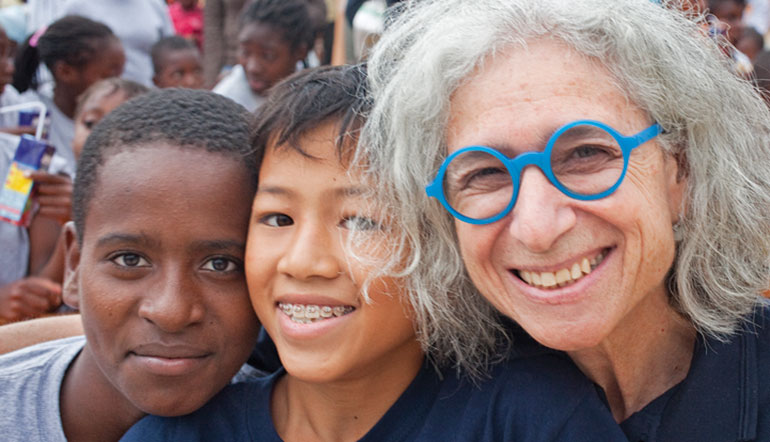I loved him from the minute I saw his photos. My partner, Diana, and others noted his sadness. I did, too, but I still adored him completely. On that hot day in Hanoi, in August 2000, I flew through the doors of his orphanage and almost demanded to know where he was. I scooped him up in my arms and held him tightly. He stared blankly with his head turned to one side. I was mesmerized. He was 18 weeks old.
During the three weeks we spent in Vietnam, Ben slept through the night and sucked down his bottles fast. He napped diligently on his little blanket across two chairs, as we ate lunch and dinner in restaurants in Hanoi and Ho Chi Minh City.
One day he was seated on my lap at a café; his leg had a tremor and the skin appeared mottled. I repositioned him and these unusual symptoms subsided. I pointed them out to Diana. Even with all my experience treating children from orphanages, I was puzzled. We took him to a clinic for a checkup. The doctor had no explanation. He did, however, diagnose Ben’s acquired torticollis, a shortening of the neck muscles likely due to birth trauma and the chronic immobility in the crib at the orphanage.
Ben worked very hard at everything. That was sad and yet I don’t recall feeling sad at the time. I was aware of his developmental delays and his depression, but I was his mama and I loved him unconditionally. That he didn’t smile and that his hands were balled into fists didn’t matter to me. These were things I knew could happen with a baby in an orphanage.
Once we got home, I called the early intervention group that I had used for many of my adoptive families. The therapists came one after another to evaluate the developmental milestones of this now butterball baby boy. He couldn’t keep his head up straight, he still held his hands in fists, and he wasn’t able to turn over. He qualified for services with an occupational therapist and a physical therapist.
I didn’t know what to expect, even with all my experience. Still, we settled into our family life. This was my kid and there was no map or pre-determined plan. We just hoped that with all this work, he would be OK, whatever that meant.
Ben had six hours of physical and occupational therapy a week but then, at 10 months old, he let out his first belly laugh and we came running to witness it. His neck had straightened over the months with a lot of manipulation, massage, and hard work on his part. He finally walked at 15 months with a great sense of pride in himself. But his thumbs hardly ever came away from his palms. He grabbed everything with his fingers alone. The therapists frankly were baffled.
What was most encouraging was his ability to communicate. He vocalized constantly right from the beginning, so those parts of his brain appeared to be very active and intact. While his body failed him in some ways, he could make himself understood. As I see it, Ben had a gift for communicating. Many of the kids I see in my office struggle with this for years and are terribly frustrated.
After five years of occupational therapy and handwriting tutoring, Ben had his thumbs back and was able to write letters and numbers indistinguishable from those of other children his age. In fact, he was quite adept and became a Lego master, and later learned to play the cello and then the piano. I look at him now, 12 years later, and he is not depressed or sad; he is an inquisitive, happy, and healthy young man who loves his family, his school, his pet cockatiel, and his home.
As an adoption medicine specialist, I have visited orphanages all over the world. I wanted to know why the children who arrived in my office looked through me and didn’t shed a tear as I drew their blood and administered vaccines; I wanted to know why some of these sweet little ones appeared limp and lifeless when offered intimacy. And I wanted to know why dear babies who were alert didn’t attempt to vocalize.
As infants, many orphans around the world lie in soiled cribs with bottles propped for their feeding, missing out on the experience of intimacy with a primary caretaker who holds, touches, and talks to them–the building blocks for attachment. As toddlers, they rock side to side and cruise unsteadily along the railings of their large pens in soundless rooms. Nevertheless, children are amazingly resilient and–with the support of loving parents who accept that the process can be very gradual and full of uncertainty–they eventually stabilize in their new home environments. The creation of a family through adoption can involve many challenges, but love and permanence are powerfully healing forces.
Excerpted from Carried in Our Hearts: The Gift of Adoption; Inspiring Stories of Families Created Across Continents, by Dr. Jane Aronson, with the permission of Tarcher, an imprint of Penguin Group. Copyright Jane Aronson 2013.



